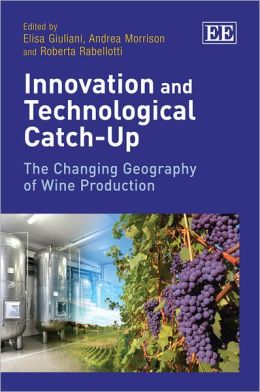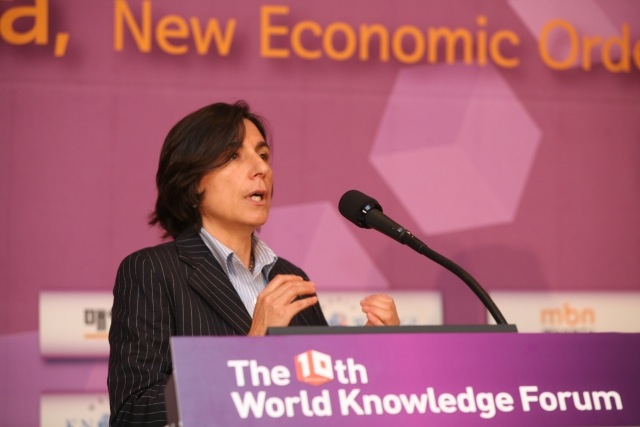Il Sole 24 Ore
The Italian newspaper Sole 24 Ore published an article on my book on Innovation and Catching Up: The changing geography of wine production.
in Articles, Media Tags: Argentina, Catch up, Chile, Emerging Countries, Innovation, Italy, South Africa, Wine industry
The Italian newspaper Sole 24 Ore published an article on my book on Innovation and Catching Up: The changing geography of wine production.
in Books, Publications Tags: Argentina, Catch up, Chile, Emerging Countries, Innovation, Italy, South Africa, Wine industry

Since the beginning of the 1990s, the supremacy of ‘Old World’ countries (France and Italy) in the international wine market has been challenged by new players, such as Australia, Argentina, Chile and South Africa, which are recording stunning performances in terms both of export volume and value. This book demonstrates that such a spectacular example of catch-up goes beyond simply copying new technologies; it entails creative adaptation and innovation, and introduces a new growth trajectory in which consistent investments in research and science play a key role.
«This book overturns the old paradigm ideas about natural-resource-based activities. It sheds light on the new opportunities for technological dynamism and catching-up by using science to open novel directions in traditional sectors. It should become a classic in what I expect will be a very important academic debate and a new trend in development policy.»
Carlota Perez
Tallinn University of Technology, Estonia; Cambridge University and University of Sussex, UK
«This excellent book demonstrates better than any other I know the strengths and limits of the concept of a national system of innovation for understanding economic development today. Any careful student of innovation or development will want to read it.»
Charles Sabel
Columbia Law School, USA
Here you can read the introduction,
The Changing Geography of Wine Production_Intro
Here you can read some reviews of the book,
regional studies,
AAG Review of Books,
Journal of Wine economics,
agriregionieuropa_n28,
Il Sole 24 Ore
You can buy the book here.
in Journal Articles, Publications Tags: Catch up, Chile, Innovation, Italy, South Africa, Wine industry
From a development perspective an investigation of the changes that have occurred in the wine industry is of particular interest because it provides evidence on how emerging economies have been able to acquire significant shares of the international market in a dynamic sector. Based on novel empirical evidence, this paper shows that emerging countries with diverse institutional models and innovation strategies have actively participated in the process of technological modernization and product standardization. These newcomers in the wine sector have responded particularly effectively to changes in demand, aligning emerging scientific approaches with institutional building efforts and successful marketing strategies.
in Journal Articles, Publications Tags: Catch up, Innovation, Wine industry
Research on University-Industry (U-I) linkages and their determinants has increased significantly in the past few years. However, there is still controversy on the key factors explaining the formation of U-I linkages, and especially related to individual researcher characteristics. This paper provides new empirical evidence and, in particular, looks at the importance of researchers’ individual characteristics and their institutional environments in explaining the propensity to engage in different types of U-I linkages. Based on an original dataset, we present new evidence on three wine producing areas – Piedmont, a region of Italy, Chile and South Africa – that have successfully responded to recent structural changes in the industry worldwide. Empirical findings reveal that researchers’ individual characteristics, such as centrality in the academic system, age and sex, matter more than publishing records or formal degrees. Institutional specificities at country level also play a role in shaping the propensity of researchers to engage with industry.
Download the pdf, JA Research Policy 2010-06
in Presentations Tags: Catch up, Chile, Innovation, Italy, South Africa, Wine industry

I was invited at a panel on the Economics of Inter- Firm Catch Up discussing how global economic recession, can be an opportunity for late-comers to enter the market and catch up with forerunners.
Download the pdf, Pres World Knowledge Forum 2009-10
in Journal Articles, Publications Tags: Clusters, Italy, Knowledge, Wine industry
The aim is to analyse the nature and extent of knowledge and information networks in an Italian wine cluster. Moreover, the relation between firms’ characteristics and the knowledge network structure is also explored. The empirical findings show that knowledge is unevenly distributed in clusters and that networks of knowledge and information differ a great deal in terms of their structure. In fact, knowledge flows are restricted to a tightly connected community of local producers, differing in terms of knowledge assets, innovation behaviour and overall economic performance with respect to the rest of the firms in the cluster.
in Articles, Media Tags: Argentina, Catch up, Chile, Emerging Countries, Innovation, Italy, South Africa, Wine industry
Richard Feimberg reviewed my book edited with Pietrobelli.
in Journal Articles, Publications Tags: Italy, Knowledge, Wine industry
In recent years, the wine industry has undergone a radical technological modernisation in which scientific research has become extremely prominent. Focusing on a regional research system related to wine, we provide a detailed account of the structural features of the research and extension institutions in the Piedmont region and how they interact. The empirical analysis is based on detailed interviews with people from research centres, universities, extension agencies as well as on a database of research projects on topics relevant to the wine industry. Social network analysis is employed to describe the structural properties of the networks that have been established among universities, research and business organisations and firms, as a result of these projects. Based on these two data sources we provide a detailed picture of the actors, linkages and processes underpinning the regional wine research system.